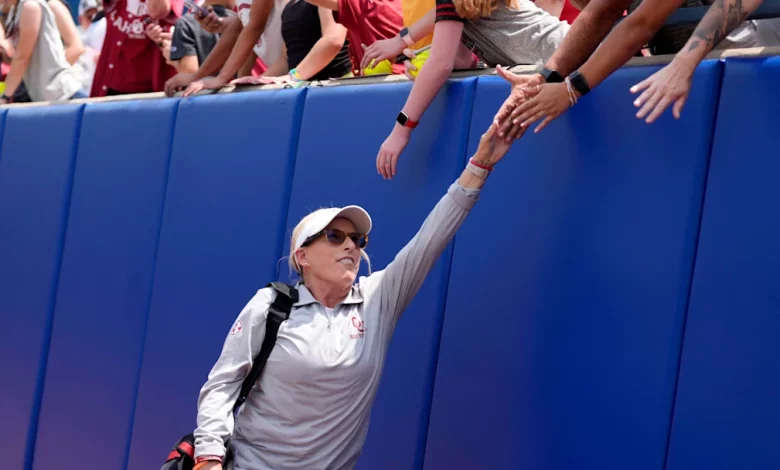OU Softball: Patty Gasso Advocates for Change to the WCWS Format

OU Softball: Patty Gasso Advocates for Change to the WCWS Format
Patty Gasso, the legendary head coach of the University of Oklahoma softball team, has long been recognized not only for her coaching excellence and national titles but also for her candid voice on issues affecting college softball. Recently, Gasso has emerged as a prominent advocate for reforming the Women’s College World Series (WCWS) format, calling for changes that could enhance fairness, competitiveness, and the overall spectacle of college softball’s premier event.
Her advocacy reflects a deep understanding of the sport’s dynamics and a desire to elevate the tournament to better serve players, coaches, fans, and the sport’s growth. This article explores Gasso’s stance, the reasons behind her calls for change, the specifics of her proposals, reactions from the softball community, and the broader implications for college softball.
—
## Context: The Current WCWS Format
### How the WCWS Is Structured
The Women’s College World Series, as it stands, is the culmination of NCAA Division I softball, featuring the top eight teams in a double-elimination format leading to a best-of-three championship series. The tournament typically spans over a week in Oklahoma City, drawing significant attention from fans nationwide.
### The Tournament Path
The format involves regional and super-regional rounds, culminating in the eight-team WCWS. Once in Oklahoma City, teams are seeded and placed into two brackets, with the winners of each bracket meeting in the finals.
### Criticisms of the Current Format
While the WCWS has become a marquee event, it is not without criticisms:
– **Seeding and Bracket Placement:** Some argue that the seeding process can be imperfect, leading to mismatched brackets or unbalanced competition.
– **Double-Elimination Fatigue:** The double-elimination format can extend the tournament length and sometimes produce matchups that seem unbalanced or disadvantage some teams.
– **Limited Rest and Recovery:** The schedule often demands multiple games in a few days, leading to fatigue and affecting team performance.
– **Lack of Innovation:** Critics say the format hasn’t evolved sufficiently to match the sport’s growth or to maximize fan engagement.
—
## Patty Gasso’s Advocacy: The Call for Change
### Background of Gasso’s Position
Patty Gasso has been vocal about her desire to see the WCWS evolve beyond its traditional structure. Her advocacy gained prominence after observing the tournament’s current limitations, especially regarding fairness and entertainment value.
Gasso’s experience coaching Oklahoma, a perennial powerhouse, gives her unique insight into the tournament’s intricacies. She recognizes the importance of a format that promotes fairness, maintains high-level competition, and appeals to a broad audience.
### Core Principles Behind Her Advocacy
Gasso’s advocacy is rooted in several key principles:
– **Fairness and Equity:** Ensuring that the best teams have an equitable chance to compete and advance.
– **Competitive Integrity:** Promoting a tournament structure that rewards skill and consistency without undue influence from scheduling or fatigue.
– **Fan Engagement:** Creating a more exciting, unpredictable, and accessible spectacle.
– **Player Welfare:** Reducing unnecessary strain and injury risks associated with a grueling schedule.
—
## Proposed Reforms: Gasso’s Vision for the WCWS
While Gasso has not laid out a single, definitive blueprint, she has expressed several ideas and principles she believes could improve the tournament:
### 1. Single-Elimination or Modified Formats
Gasso suggests exploring formats that reduce the number of games, such as a single-elimination or a “double-elimination with a twist” approach. She believes that a more decisive structure could enhance excitement and reduce fatigue.
### 2. Re-seeding and Dynamic Brackets
She advocates for a system where teams are re-seeded after each round based on performance, ensuring that the strongest teams face off at the right stages and that upsets are rewarded.
### 3. Longer Rest Periods and Scheduling Adjustments
To combat fatigue, Gasso proposes scheduled rest days or more flexible scheduling to allow players recovery, leading to higher-quality games.
### 4. Incorporating Best-of-Series in the Final Rounds
Instead of a single-game final or a best-of-three series only at the championship, she suggests implementing best-of-series earlier in the bracket to ensure the most consistent teams advance.
### 5. Regional and Super-Regional Expansion
Gasso has also voiced support for expanding the tournament to include more teams or to reconfigure regional rounds for higher competitiveness and fairness.
—
## Rationale Behind Gasso’s Proposals
### Addressing Fairness and Competitiveness
Gasso emphasizes that a tournament should reward teams that perform consistently and fairly throughout the season. She believes that current formats sometimes allow luck, scheduling, or fatigue to influence outcomes disproportionately.
### Enhancing Player Experience and Health
The grueling schedule can take a physical and mental toll on players. Gasso’s proposals aim to prioritize player health, reduce burnout, and ensure athletes can perform at their best.
### Increasing Fan Engagement and Viewership
A more dynamic and unpredictable format could boost fan interest, generate more compelling storylines, and attract broader audiences, vital for the sport’s growth.
### Aligning with Other Sports
Gasso notes that many professional and international tournaments use series-based formats or re-seeding, suggesting college softball should evolve similarly.
—
## Reactions from the Softball Community
### Support and Enthusiasm
Many coaches, former players, and analysts have expressed support for Gasso’s ideas, citing the need for innovation and fairness. Some see her proposals as a way to modernize college softball and make the WCWS more exciting and equitable.
### Skepticism and Challenges
Others raise concerns about logistical challenges, increased costs, and potential resistance from stakeholders accustomed to the traditional format. There is also debate over whether a radical overhaul is necessary or whether incremental adjustments could suffice.
### NCAA Response
The NCAA has historically been cautious about changing tournament formats, prioritizing tradition and logistical feasibility. However, the growing popularity of softball and calls from influential voices like Gasso have prompted discussions at the organizational level.
—
## Broader Implications for College Softball
### Growth and Globalization
Reforming the WCWS could position college softball for continued growth, attracting international attention and increasing television ratings.
### Player Development and Welfare
A more athlete-friendly schedule could improve player development, reduce injuries, and make the sport more appealing to recruits.
### Competitive Balance
Adjustments could help level the playing field, giving more teams a realistic shot at success and reducing the dominance of a few power programs.
### Legacy and Leadership
Gasso’s advocacy positions her as a leader advocating for the evolution of the sport, potentially inspiring other coaches and administrators to pursue innovative ideas.
The Future of the WCWS?
Patty Gasso’s vocal push for reforming the WCWS format underscores her dedication to elevating college softball. Her proposals aim to balance fairness, excitement, and player well-being, aligning with broader goals of growing the sport’s stature.
While significant hurdles remain—logistical, financial, and cultural—the conversation she has sparked is vital. As college softball continues to expand its reach and influence, evolving its premier tournament could be essential for ensuring its sustained success and relevance.
The dialogue initiated by Gasso reflects a sport at a crossroads—honoring tradition while embracing innovation. Whether her ideas lead to concrete changes or inspire alternative solutions, her advocacy demonstrates her commitment to shaping a brighter future for college softball.









